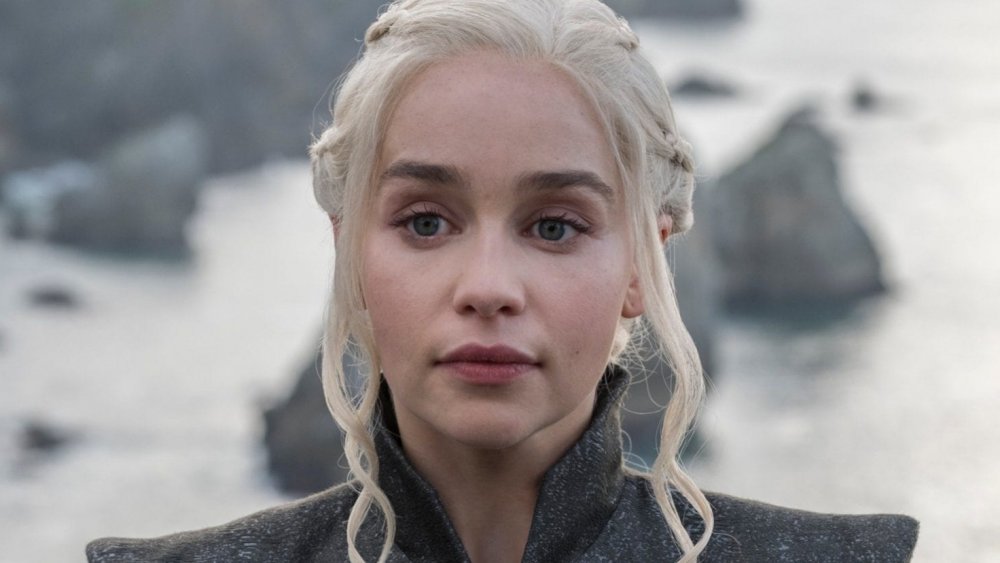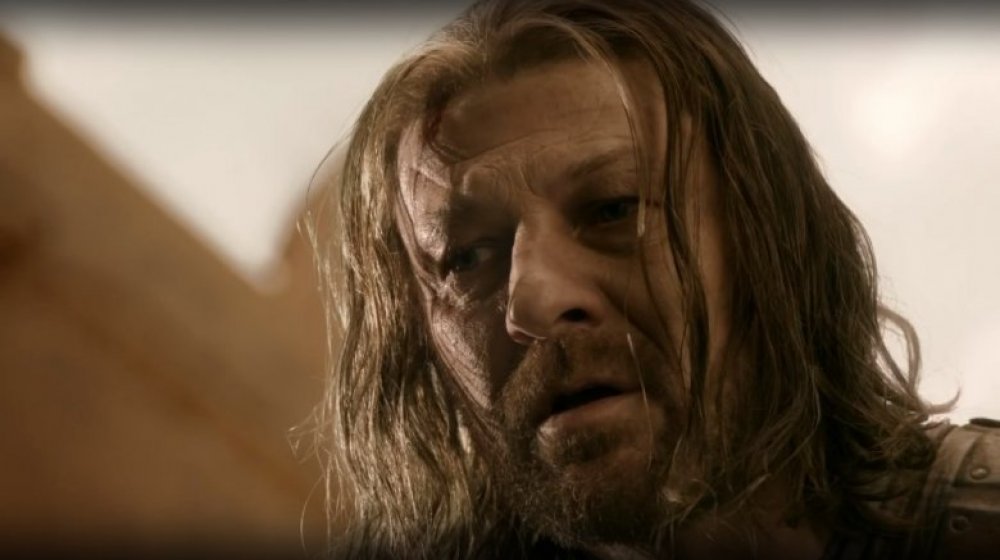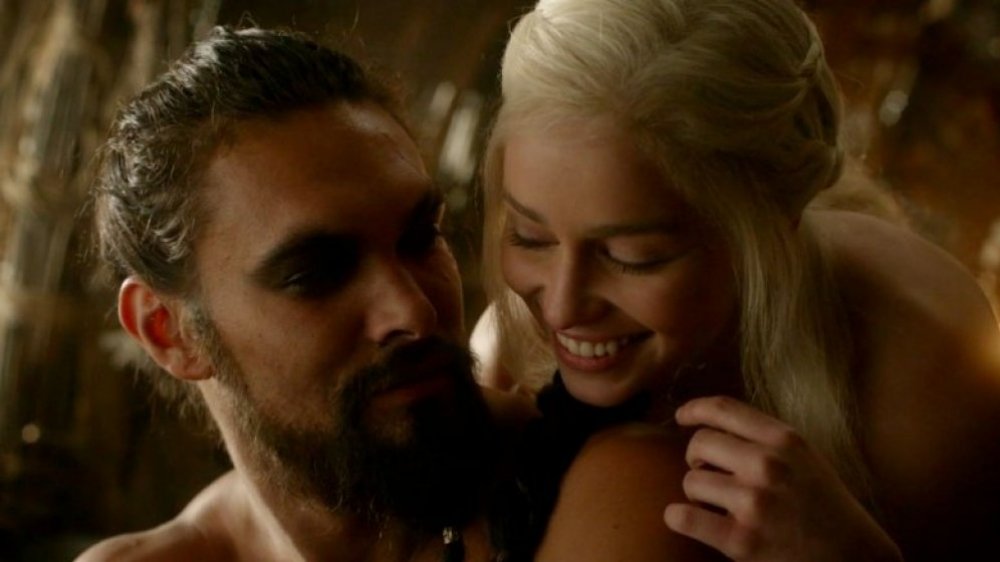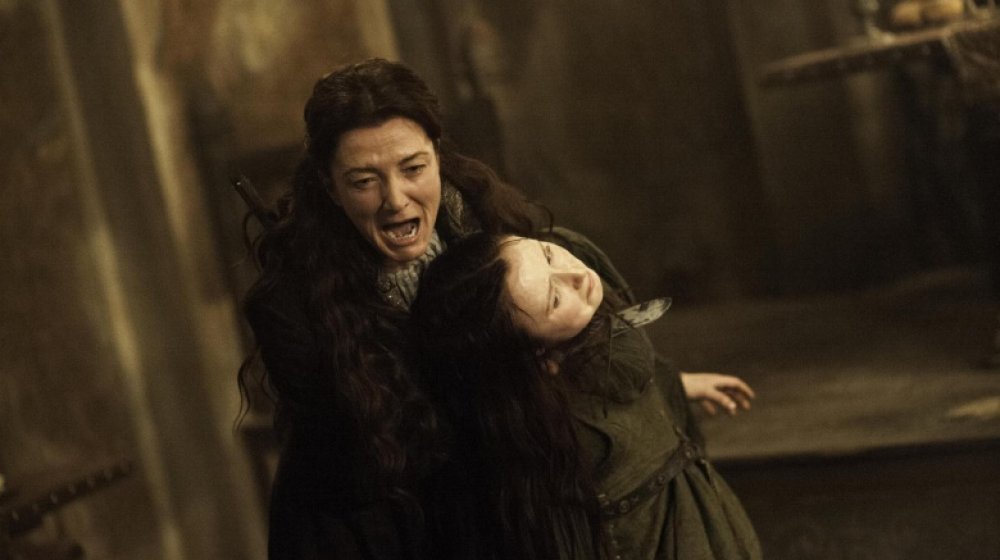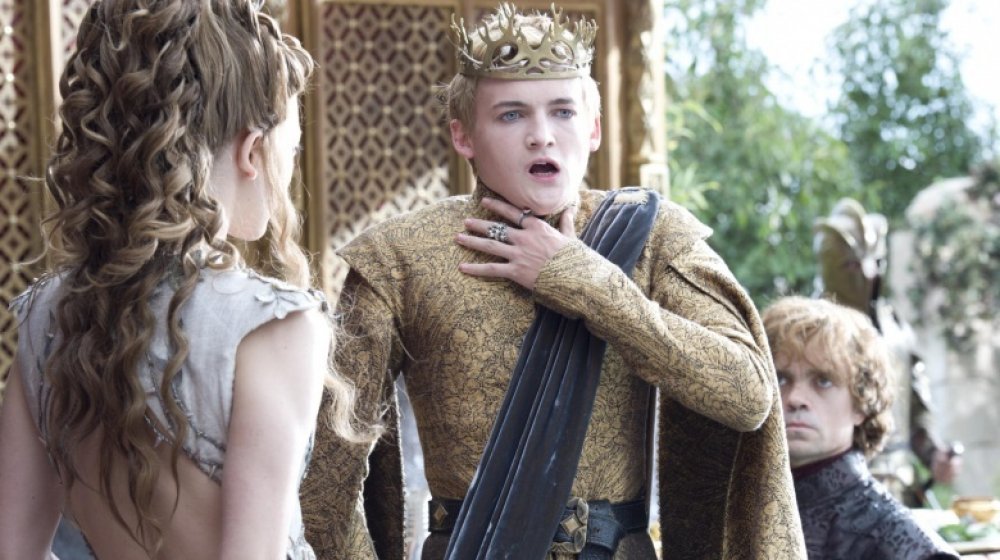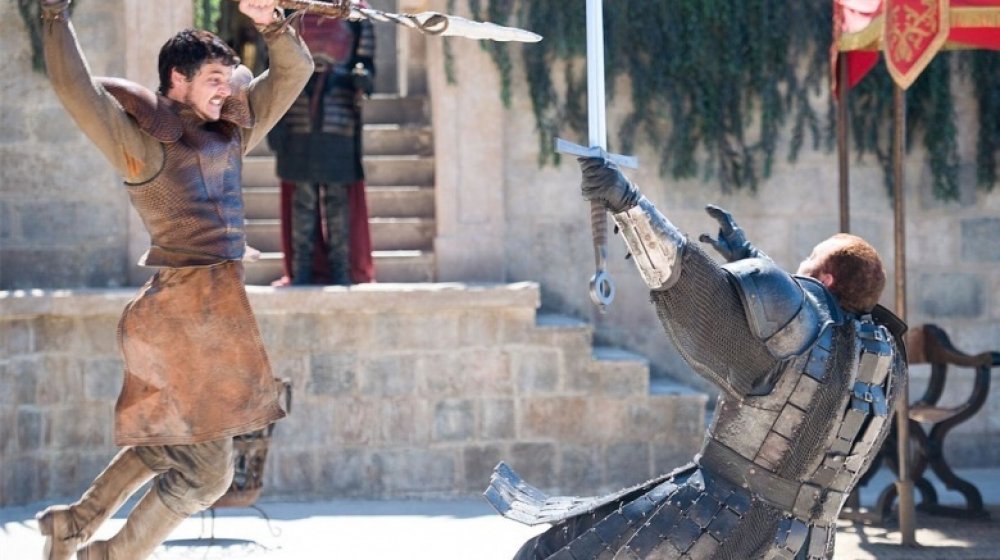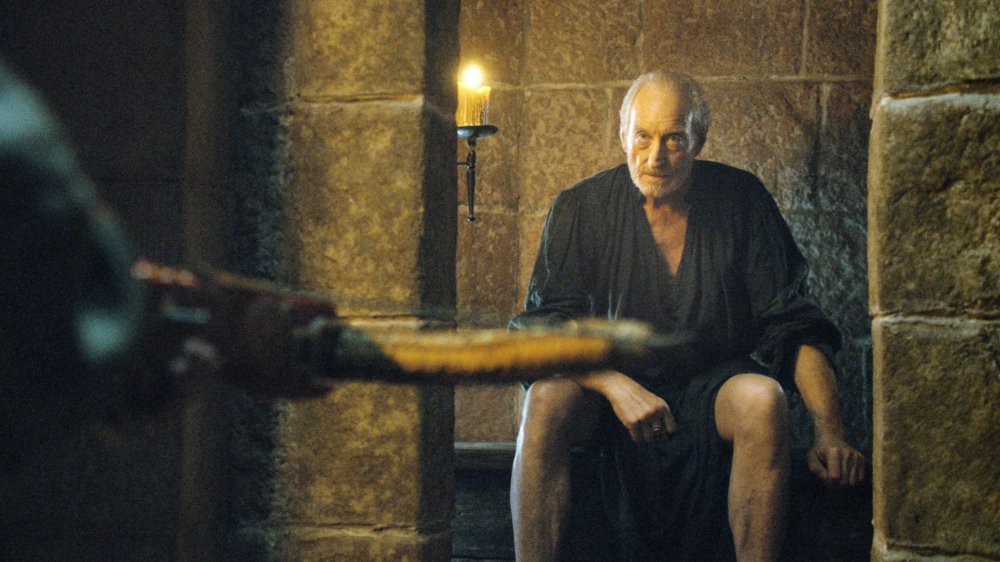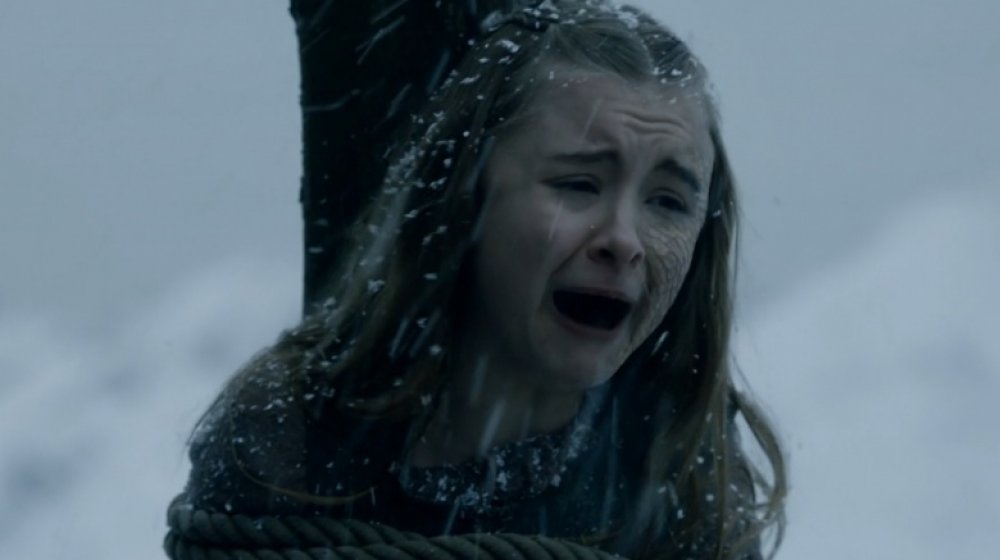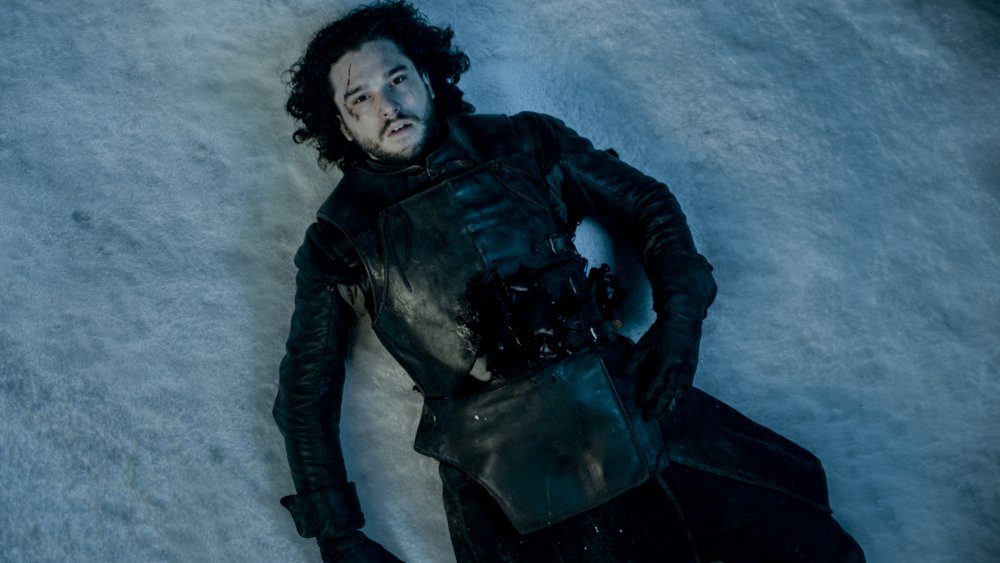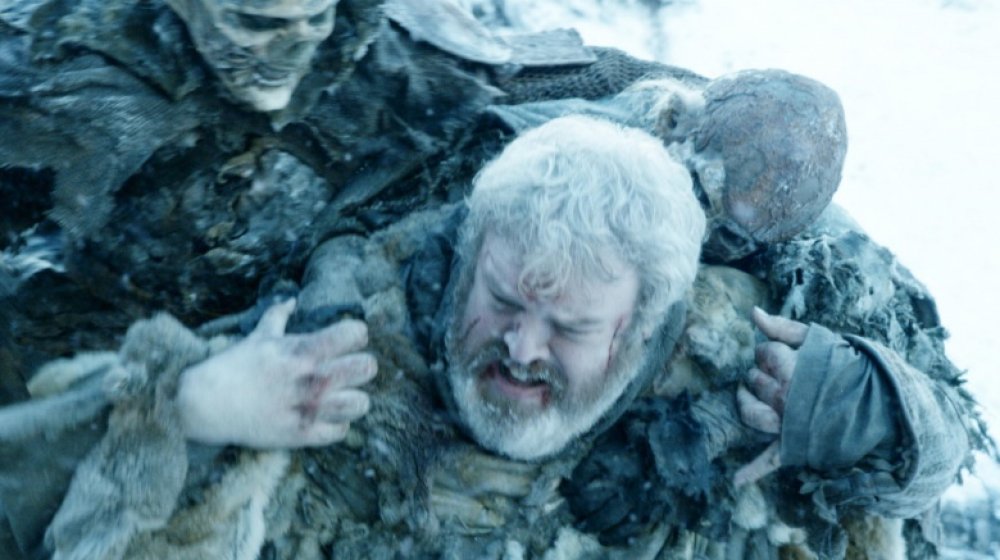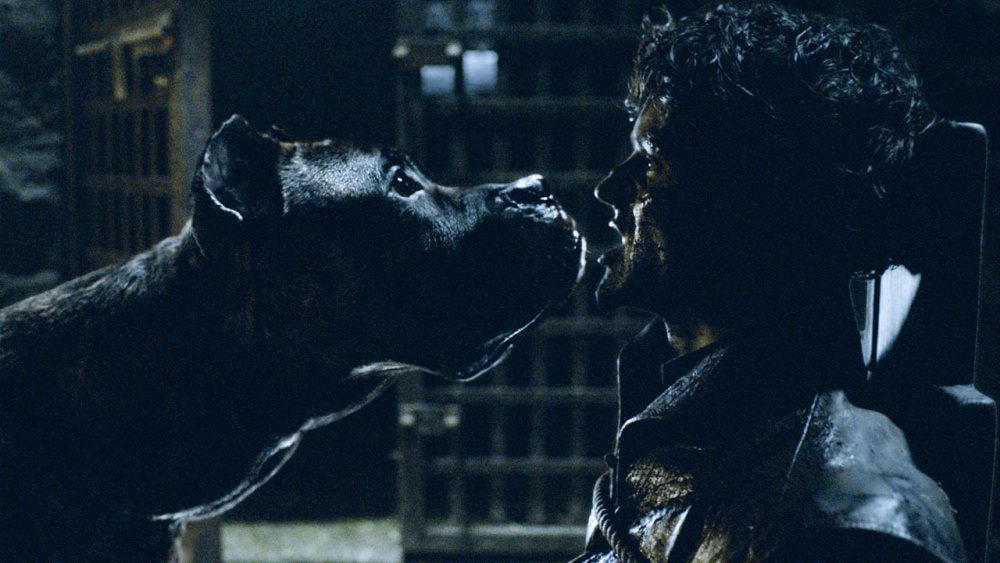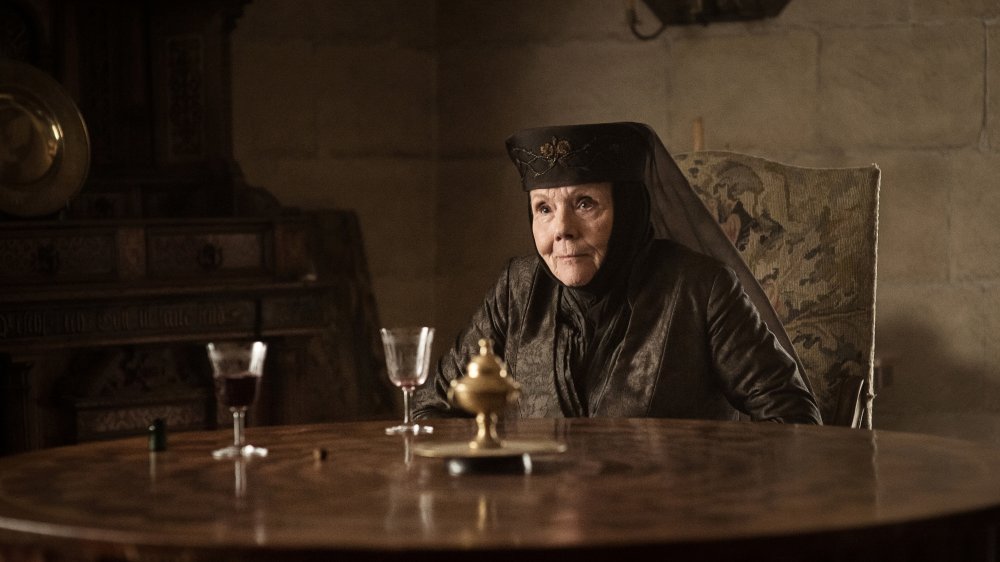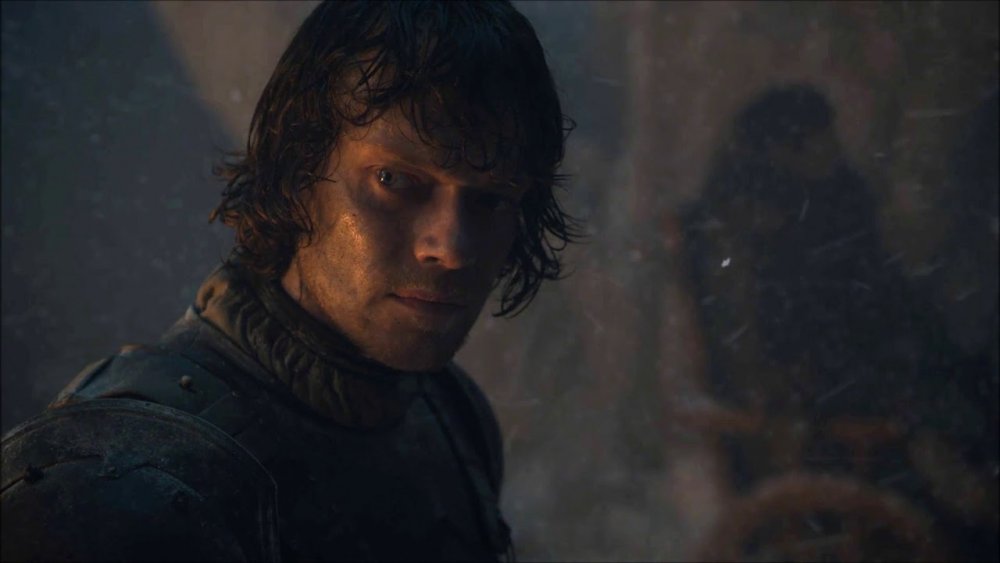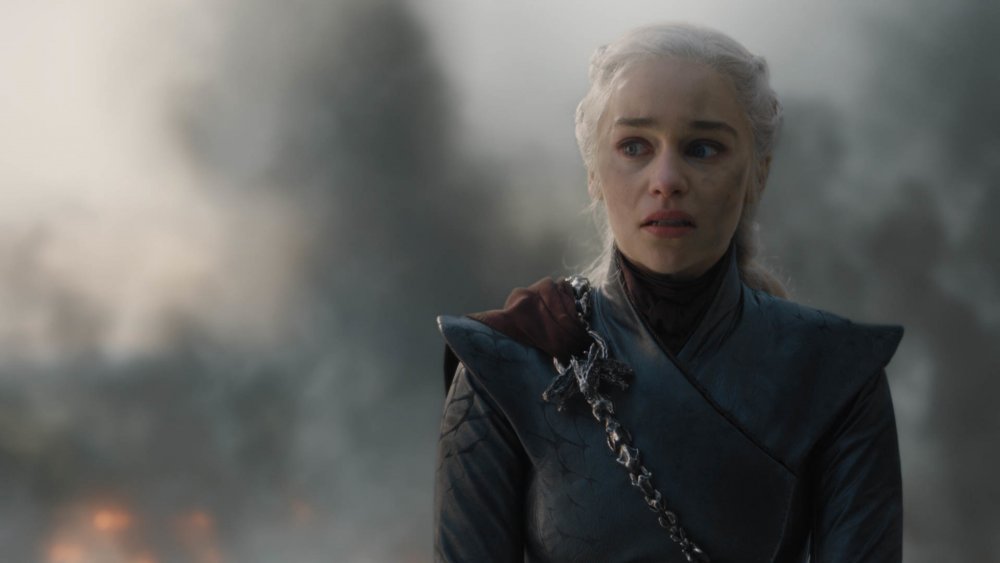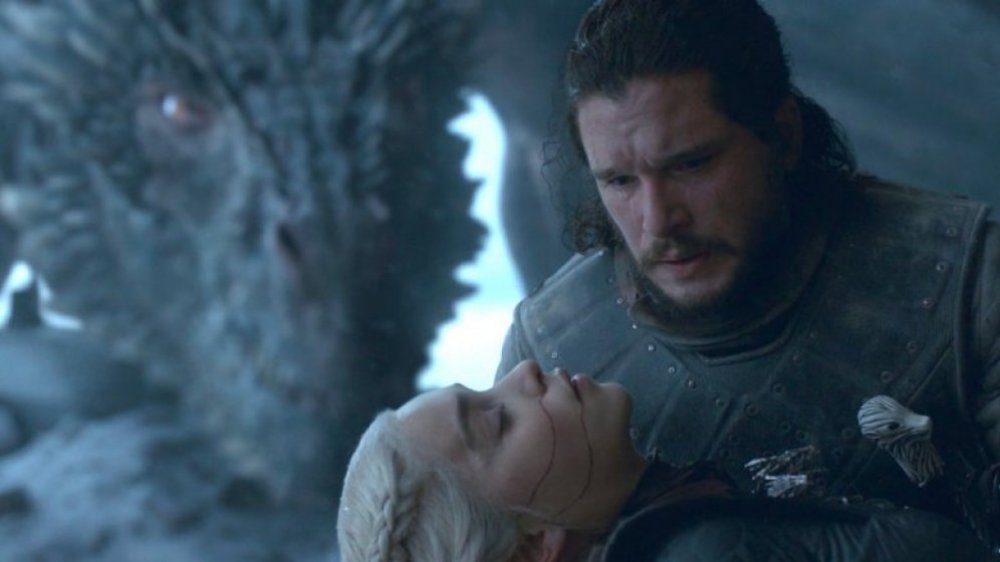Why These Game Of Thrones Characters Had To Die
If you were a fan of Game of Thrones during its eight seasons and nearly decade-long run on HBO, during which time it dominated the pop culture landscape, you know one thing is true about Thrones — it's a losing battle to pick a favorite character. Right away, the show literally killed off its darlings one by one, from would-be protagonists to pregnant women to young children, making it impossible for Thrones fans to figure out where the show would go next.
However, the truth is that even though plenty of Game of Thrones favorites met violent ends throughout the show's tenure, many of them simply had to die, whether it was because they'd already died in A Song of Ice and Fire — the series of fantasy novels by George R.R. Martin that served as the basis for the series — or because their death provided a much-needed narrative push to move the story along. Here are some of the most notable deaths throughout Game of Thrones and why those characters needed to close out their time on the show. Spoilers for all of Game of Thrones to follow!
Ned Stark's beheading changed Game of Thrones
When Game of Thrones first gets started, it definitely seems like Eddard "Ned" Stark, the highborn patriarch of the Starks of the North, was the show's protagonist. An honorable man and a strong warrior played by Lord of the Rings' Sean Bean, Ned kicks off the proceedings by doing his duty and beheading a deserter of the Night's Watch, providing some upsetting foreshadowing of his own fate.
But after an ill-advised move to King's Landing to help out his friend, King Robert Baratheon (Mark Addy), Ned finds himself in a sticky situation when he starts to suspect that Robert's son, Joffrey (Jack Gleeson), might not be a true Baratheon after all. Ned is completely right — Joffrey, like his brother and sister, is the product of incest between Queen Cersei Lannister (Lena Headey) and her twin brother, war hero Jaime Lannister (Nikolaj Coster-Waldau). Ned's nobility and quest for the truth ultimately costs him his head, a move lifted straight from Martin's books that's meant to show in the world of Game of Thrones, nothing is as it appears on the surface.
Khal Drogo's death drove Daenerys' story
When we first meet Daenerys Targaryen (Emilia Clarke), the future "Mother of Dragons" and would-be queen of Westeros, she's nothing more than a young, scared bride approaching her wedding to Khal Drogo (Jason Momoa), a Dothraki warlord. Things are a bit rough between Daenerys and Drogo at first, thanks to a language barrier and his antiquated ways, but eventually, they learn to love each other, making their romance even more tragic.
When Drogo suffers from an infected wound, Daenerys tries to make a deal with a witch, Mirri Maz Duur, to save Drogo's life using their unborn child as a pawn, but in a cruel act of revenge, the witch leaves Drogo in a vegetative state, lost to Daenerys forever. After smothering Drogo to end his suffering, Daenerys joins her husband and a trio of dragon eggs on his funeral pyre. When the flames subside, she's unharmed and boasts three baby dragons in his stead. Drogo's death devastates Daenerys, but it teaches her to wield her kindness — which she foolishly extended to Mirri Maz Duur — wisely, and without the loss of her husband, she would never have gained three dragons.
The Red Wedding proved nobody was safe in Game of Thrones
In case Ned Stark's death didn't tip you off, no characters are ever truly safe on Game of Thrones, a fact that comes to horrifying fruition in the season three episode "The Rains of Castamere." Known among fans of the books as "The Red Wedding," the episode finds Ned's widow, Catelyn Stark (Michelle Fairley), visiting the home of Walder Frey (David Bradley), along with her son Robb (Richard Madden) and his wife, Talisa. They've come to witness a marriage, but their host is angry that Robb married Talisa for love instead of one of his many daughters.
Thrones fans everywhere remember, all too clearly, the moment when the doors to the wedding hall lock behind the Starks, and the massacre begins, with Frey's men killing Talisa first as Robb tries in vain to save his pregnant wife. The final image of Catelyn, screaming for her dead son as she executes one of Walder's daughters, only to have her throat slit moments later, is one of Thrones' most unforgettable moments. As painful as it was, the Red Wedding proved, once again, that nobody in Thrones was sacred, and that even the best of the best may well meet the worst, most gruesome ends.
Joffrey's death was a long time coming
Right from the beginning, Joffrey Baratheon, a secret product of incest between his mother and uncle, earns Game of Thrones' top spot as its most reprehensible character. An impetuous, cruel, and violent young king who begins a war by beheading Ned Stark on a whim, Joffrey is inexcusably terrible, making his death all the more satisfying.
After the Red Wedding, viewers were treated to yet another doomed celebration when Joffrey marries his bride, Margaery Tyrell (Natalie Dormer), in the show's fourth season. As Sansa Stark (Sophie Turner) and her unwilling husband, Tyrion Lannister (Peter Dinklage), look on, Joffrey hosts an offensive play starring dwarves as prominent men of Westeros, abuses his wedding guests, and continues his long-standing insufferable streak, much to everyone's displeasure. When he chokes to death after taking a sip of poisoned wine, it does more than satisfy everyone on-screen (and everyone watching at home) — it drives a wedge between Tyrion, accused of his nephew's murder, and his sister, Cersei, that lasts for the remainder of the series.
Oberyn Martell is taken down by his own hubris
As Tyrion awaits a trial for the murder of his nephew, King Joffrey — a murder he didn't actually commit — he realizes he has precious few allies left to help him, save for one: Oberyn Martell (Pedro Pascal), the Red Viper of Dorne, who traveled from his faraway home for the royal wedding. Oberyn pities Tyrion, believing his innocence, but he also has his own score to settle. Long ago, Oberyn's sister, Elia, the wife of the late King Rhaegar Targaryen (Daenerys' brother), was raped and murdered by Ser Gregor Clegane, known as "the Mountain," and Oberyn has waited years to get revenge.
On the day of Tyrion's trial by combat, Oberyn faces off against the Mountain to provide justice for both Tyrion and Elia, and at first, he seems destined to succeed. However, after knocking the Mountain to the ground, Oberyn's pride gets the best of him, and when he gets too close to his opponent while taunting him, the Mountain takes control, crushing Oberyn's head to a bloody pulp within seconds. Oberyn might've been one of Thrones' more delightful characters, but his bitter end — intended to show where hubris will get you — is one of its most disgusting moments.
Shae and Tywin Lannister provide closure in Game of Thrones
Facing a death sentence after his botched trial by combat, Tyrion plots his escape, and with his brother Jaime's help, he finds a way out of King's Landing. However, he makes one detour first, heading to his father's bedchambers. During his trial, Tyrion's esteemed father, Tywin Lannister (Charles Dance), turned against his son and seemed entirely willing to put him to death for a crime he knew Tyrion didn't commit. Now, Tyrion wants revenge.
Before Tyrion even gets to Tywin, he finds someone even more shocking in Tywin's bed — Shae (Sibel Kekilli), a prostitute who Tyrion deeply loved before she lied and testified against him during his trial. After strangling her with a heavy golden necklace that's clearly a gift from Tywin and shedding a few tears, Tyrion makes his way into the bathroom, where he meets his father on the toilet. Just before he leaves King's Landing, Tyrion fires two fatal blows from a crossbow, killing Tywin and fulfilling closure for a lifetime of disdain and discord, while also giving Tyrion's character even more depth and complexity than before.
Shireen Baratheon is supposed to be a sacrifice
In the aftermath of King Robert Baratheon's death, several candidates emerge to fight for the Iron Throne, one of whom is his brother, Stannis Baratheon (Stephen Dillane). Stannis, who correctly believes that Joffrey is not Robert's legitimate heir, is technically next in the line of succession, but unfortunately, he has a fairly slow start on his journey towards the throne, thanks to infighting with his younger brother, Renly (Gethin Anthony). After acquiring a Red Priestess, Melisandre (Carice van Houten), Stannis grows more powerful, but eventually, she tells him he must pay a high price to take the throne.
At Melisandre's urging, Stannis sentences his own young daughter, Shireen (Kerry Ingram), a sweet girl stricken with greyscale, to death, burning her alive in a bid to the gods to grant Stannis a full victory. It's one of Game of Thrones' most disturbing moments, but in a shocking twist, this doesn't work. However, Shireen's death does drive her mother to suicide, and when Stannis is defeated and killed, the Baratheon line ends with him, taking another great house of Westeros out of contention due to one man's selfish act.
Jon Snow pays a price for doing what's right
During the show's second season, Jon Snow (Kit Harington), Ned Stark's alleged bastard who's taken up a position within the Night's Watch, ends up falling in with a group of wildlings north of the Wall, and from that point on, a small part of his allegiance lies with the free folk, despite the long-standing rivalry between the two factions. However, his fellow Night's Watch members grow suspicious of his affinity for wildlings, especially when Jon, the newly named lord commander of the Night's Watch, tries to argue that the wildlings deserve salvation from the oncoming threat of the White Walkers just as much as anyone else.
As revenge for Jon's good heart, a small Night's Watch mutiny forms, and his ex-buddies lure him out of his chambers late at night, stabbing him repeatedly and leaving him for dead in the snow as the show's fifth season draws to a close. Though Jon comes back to life in the next season, courtesy of Melisandre, his death is a stark reminder that doing the right thing often comes at an enormous cost.
Hodor dies from time travel gone wrong
As Bran Stark (Isaac Hempstead Wright), the second youngest child of the Stark clan, travels throughout Westeros and beyond, he comes under the tutelage of the Three-Eyed Raven (played by the late Max von Sydow), an omniscient, all-seeing being who can travel throughout the entire timeline of Westeros and its storied history. As Bran begins to explore by disappearing into his own mind alongside the Three-Eyed Raven, his protector, Hodor (Kristian Nairn) — who can't say any word other than his own name — must guard Bran's prone body.
However, when Bran goes back in time to see a young Hodor at Winterfell — and beyond that, a version of Hodor who can speak normally — he inadvertently wreaks havoc on his loving yet simple-minded guardian. When wights attack Hodor and Bran, the gentle giant valiantly tries to fight them off, while the Hodor of the past experiences a seizure, screaming "hold the door" until it mutates into a tragic portmanteau: "Hodor." As Hodor is torn to shreds by the wights, Bran realizes the extent of his own power, and understands that not only did he cause Hodor's mental distress throughout his life, but his actions directly caused Hodor's death, as well.
Ramsay Bolton shows Sansa her own strength
With Joffrey out of the picture, Ramsay Bolton (Iwan Rheon), the legitimized bastard of the Bolton clan, picked up the king's mantle to become Thrones' worst character. A textbook sadist with serious bloodlust and a talent for torture, Ramsay Bolton completely destroys Theon Greyjoy (Alfie Allen), both physically and mentally, turning him into a shell of a man before he gets his hands on Sansa Stark, marrying her to gain control of the North. From that point on, he brutalizes and abuses Sansa, raping her on their wedding night and hitting her to maintain his grip on her.
Sansa and Theon manage to escape and reunite with Jon Snow for protection, and when Jon and Ramsay face off for control of Winterfell in the sixth season's Battle of the Bastards, all hope seems briefly lost until Jon finally regains the upper hand. From there, however, he lets Sansa take control, which she does in full force by letting Ramsay's starving dogs attack their bloodied, beaten owner. Sansa begins the show as a whimpering, selfish young girl, but this major turning point marks the moment where she truly becomes a fighter.
Olenna Tyrell goes down fighting in Game of Thrones
As the matriarch of the powerful, well-regarded Tyrell family of Highgarden, Olenna Tyrell (Diana Rigg) strikes an imposing figure right up until her very last moment on Game of Thrones. The grandmother of Margaery Tyrell, the ambitious heiress of the Tyrell house who serves as queen of Westeros for two brief stints, Olenna thoroughly earns her nickname as the "Queen of Thorns," famous for her sharp wit and barbed words (though the nickname is also a play on the Tyrell house sigil, which features a rose). Olenna is a shrewd, smart strategist, and she looks out for herself and her loved ones above all else. So when Sansa tells her that Joffrey is as cruel as everybody says, she, not Tyrion, poisons him at his wedding, and eventually, she takes arms against the Lannisters to side with Daenerys Targaryen, her dragons, and her foreign armies.
However, Olenna ends up overpowered by enemy armies and faced with Jaime himself, and when the Kingslayer offers her a merciful death of poisoned wine, she accepts gladly. Before drinking the entire glass, she confesses to Jaime that not only did she kill Joffrey, but she knew the young king was Jaime's son, proving that despite the Tyrell house becoming extinct in that moment, Olenna still had the upper hand up until her last breath.
In his death, Theon Greyjoy comes full circle
In terms of character arcs on Game of Thrones, few figures on the show go through quite as much as Theon Greyjoy. Initially a cocksure, conceited ward of the Stark family who was lifted as a young boy from his family in the Iron Islands, Theon snivels and snarls his way through life, committing heinous acts before ending up a hostage of the sadistic Ramsay Bolton. As Ramsay's captive, Theon forgets his name and his pride, referring to himself as "Reek," until he finally escapes Ramsay's clutches and begins to claw his way back to his legacy.
In the end, Theon — who once falsely claimed that he killed both Bran Stark and his younger brother, Rickon — dies in service of Bran during the Battle of Winterfell, determinedly protecting the young Stark from the approaching Night King. After a roller coaster of an arc, Theon finally comes full circle, dying to protect the family who treated him like a son.
The deaths of Viserion, Rhaegal, & Missandei drive Daenerys to her breaking point
Throughout the series, Daenerys, once a naive young girl, grows into a conqueror, a ruler, and an outright warrior, constantly flanked by her three dragons and her loyal followers. After taking down slave cities like Astapor, Daenerys only gains more and more power, and it's clear that she feels invincible. However, as the show nears its endpoint, cracks in Daenerys' armor become apparent.
During the seventh and eighth seasons, Daenerys loses two of her dragons, Viserion and Rhaegal, as well as her closest confidante and maidservant, Missandei (Nathalie Emmanuel). Viserion falls at the hands of the Night King and becomes an ice dragon, Rhaegal is shot down by Lannister and Greyjoy forces, and worst of all, Missandei is cruelly beheaded by Cersei as a show of brute force against Daenerys. In losing two of her "children" and, arguably, her best friend, Daenerys is pushed to her limits, which spurs her to destroy King's Landing and leave no survivors in the show's penultimate episode.
At the end of Game of Thrones, Daenerys Targaryen is saved from her own worst impulses
After Daenerys torches and sacks King's Landing, refusing to spare innocent women and children as she takes her revenge against Cersei with her largest and only remaining dragon, Drogon, she's ready to assume control of the Iron Throne, but there are many who don't want her to ascend to full power after seeing her commit heinous crimes. Jon Snow, Daenerys' lover/nephew, finds himself particularly conflicted, and after visiting Tyrion — Daenerys' former hand of the queen, who resigns in disgust — in prison, he knows what he has to do.
Jon intercepts Daenerys just as she finally reaches the Iron Throne, the symbol she's worked so hard to conquer, and before she can sit down, he confronts her about her violent means. Though she works to convince him that they can create a new and just world together, Jon is resigned, giving her one last kiss before he stabs her to death. As she bleeds out, Drogon, stricken with grief, sets the Iron Throne ablaze and flies off with his mother, but in the end, Jon did the right thing by saving Westeros from a woman who was, ultimately, corrupted by absolute power.
